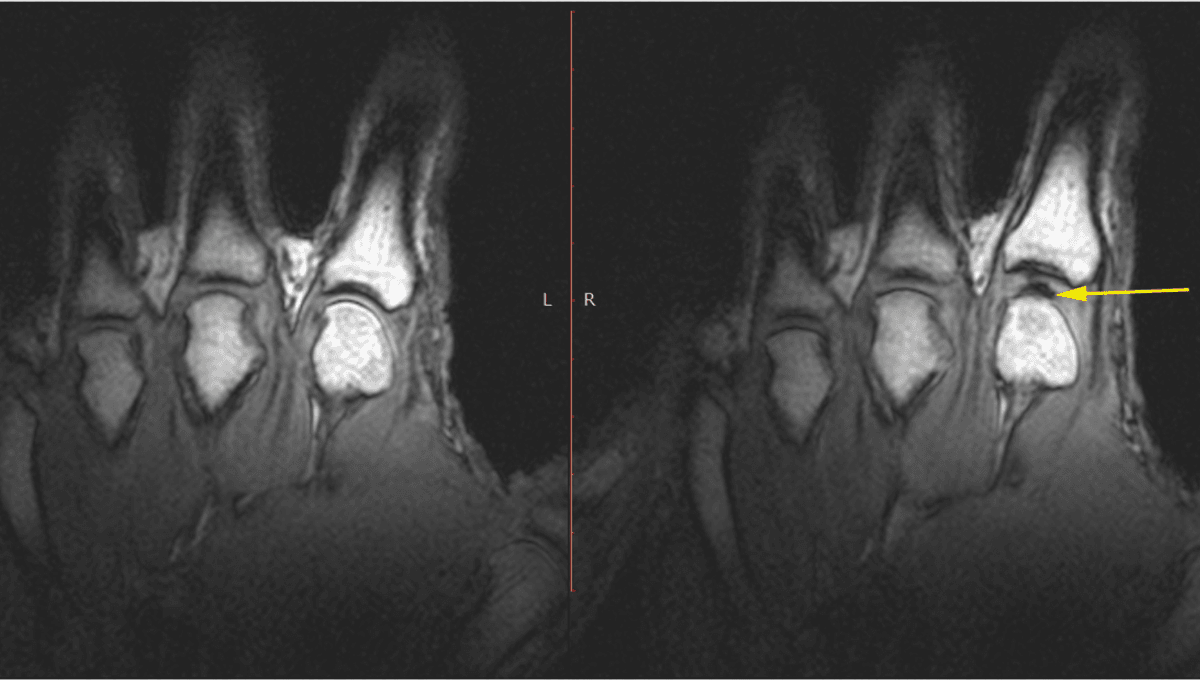
Cracking your knuckles is right up there with the most divisive things you can do at the dinner table. Some shrug it off, some fall to their knees crying, “Won’t somebody please think of the arthritis?!”
ADVERTISEMENT GO AD FREE
It is really quite remarkable how a small bend of the finger can elicit a snap, crackle, or pop loud enough to be heard across the entirety of a quiet library. Knuckles and other joints can feel a little less stiff after they’ve made a spectacle of themselves, so what’s going on when we hear that sickening sound?
Why your knuckles crack
One of the more bizarre study set-ups in 2015 saw a human participant lay down in an MRI machine with a contraption on their finger that meant scientists could capture the internal machinations of a knuckle crack in real-time. It had long been thought that the cracking sound was the result of a tiny gas bubble collapsing in the synovial fluid that surrounds our joints, but not so, said the MRI study.
Instead, what scientists saw was that the act of cracking a knuckle actually created a gas cavity where there previously wasn’t one. It’s the result of a process called tribonucleation and it goes a bit like this:
- Joint surfaces are where they’re supposed to be as the person begins applying force.
- Joint surfaces resist separation.
- Critical force is reached, pulling the joint surfaces apart, suddenly forming a vacuum-like space filled with gas – and that’s your crack!
The source of that crack was also tested in research that used ultrasound technology to study the same thing. Ultrasound can see processes happening within the body up to 100 times faster and detect things up to 10 times smaller than MRI scanners. So, what did they see?
“What we saw was a bright flash on ultrasound, like a firework exploding in the joint,” said Robert D. Boutin, M.D., at the time a professor of radiology at the University of California, Davis (UC Davis) Health System, in a statement. “It was quite an unexpected finding.”
ADVERTISEMENT GO AD FREE
The team was confident that the knuckle cracking sound and bright flash on ultrasound were connected to changes in pressure associated with a gas bubble in the joint. It didn’t definitively settle the formation vs. collapse debate, but Boutin did say to the Washington Post that since the flash only ever came after the crack, “Perhaps that supports the bubble formation theory, not the bubble popping theory.”
What cracking knuckles means for your health
In the above MRI-based study, it was observed that the cavity hung around even after the sound was over and then faded away, with no visible damage to the joint observed. Cracking knuckles didn’t seem to alter the joint spacing in the long term, but it’s worth noting that only one participant was used in the research.
That said, previous research found no “detectable immediate adverse” effects from knuckle cracking. Johns Hopkins also says there’s no evidence it’s linked to arthritis, which is often the thing people are most likely to shout at you if you crack your knuckles in public.
Of course, everyone is different and if you’re finding that cracking your knuckles is associated with pain or any other negative symptoms, it’s worth consulting a physician – but if you’re currently Googling in fear that your knuckle-cracking habit has destroyed your hands forever, rest easy. The science indicates your hands will be just fine, and if you want some help breaking that habit, then boy do we have the feature for you.
ADVERTISEMENT GO AD FREE
All “explainer” articles are confirmed by fact checkers to be correct at time of publishing. Text, images, and links may be edited, removed, or added to at a later date to keep information current.
The content of this article is not intended to be a substitute for professional medical advice, diagnosis, or treatment. Always seek the advice of qualified health providers with questions you may have regarding medical conditions.
Source Link: What Is That Horrible Sound When You Crack Your Knuckles?